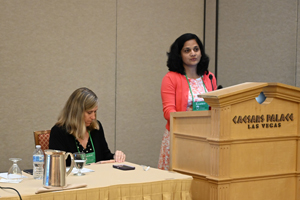
One of the themes at the 2019 Technology & Transfer Conference is "Women in Technology." With featured presenters like Duana Malone and Bridget Burns, innovative women are well-represented here -- but that doesn't mean their paths were easy.
On Monday afternoon, Helen B. Garrett, University Registrar and Chief Officer of Enrollment Information Services from the University of Washington; Shweta Kadam, Director of Information Technology from the University of Nevada, Las Vegas; and Christine
S. Paal, Assistant Vice President and University Registrar from Boston University, offered the "Mentors and Messes" session (and follow-up roundtable). The session offered leadership lessons, addressing some of the challenges women face in tech
and effective strategies for meeting those challenges.
What’s holding #WomenInTech back? Lack of mentors.
In a survey shared by Garrett,
44% of women interviewed cited lack of mentors, lack of leadership development for women, inadequate pipelines to leadership, and the “bro culture” as why there is a lack of women in tech.
Conversely, 34% of men cited lack of tech know-how as the reason why there were less women in tech.
Why were men so confident in that it was lack of skilled women that left them sparse in leadership? Garrett addressed the concept of the imposter syndrome that many women in the workforce suffer from--the idea that they didn’t deserve a seat
at the table. Her solution was peer mentoring--specifically during every lunch hour when she could wrangle it. Garrett discussed four mentors who imparted various life wisdom to her: to monitor what she put in emails as a precaution, work/life
balance, and not encroaching in other departments’ work.
Kadam went further, encouraging women to express themselves and be confident in who they are. She recommended being an active listener to build trust and enhance your own leadership skills by understanding different perspectives. She admitted it’s
not always the easiest to work on your professional development, her weakness being networking. By branding herself and being active within AACRAO and her campus, she found the process more organic and natural.
Paal suggested “doing what you think is right” to ease the awkwardness of processes like networking. For ascension to leadership, she pushed the idea of having a bold vision--if you aren’t detail-oriented or need more time, hire
people who can collaborate with you. Finally, she wants more women in the workforce to put in the effort to learn the language of whatever department, institution, or organization that they are vetting to make collaboration easier.
Their overall consensus? Get involved. AACRAO’s Women’s Caucus encourages mentorship and you can gain advice from your fellow peers.